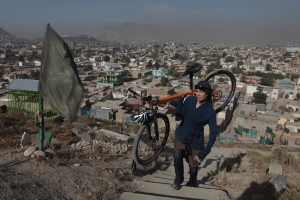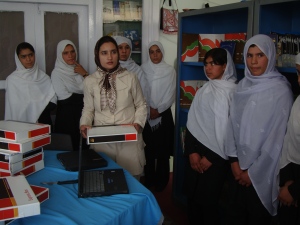
On October 3rd this year, my birthday coincidentally, I became the first woman to mountain bike in Afghanistan. The irony of accomplishing something like this was that it started out so simply….each trip I’ve spent in Afghanistan I’ve longed for my bike. The goat trails, the dirt roads, and the incredible mountains scream out to me to get pedalling!
The non profit I founded, Mountain to Mountain, is focused on women and children’s education and empowerment in remote mountain communities, in particularly in Afghanistan. Yet a large part of our ethos is connecting communities and cultures. I have come to realize that being the founder of a non profit and a mountain biker is not necessarily mutually exclusive.
So this trip, I made the decision to lug my trusted steed on the arduous journey from Colorado to Kabul. Mountain to Mountain becoming quite literal as my Niner biked its way through Singlespeed World Championships in Durango, Colorado on a Saturday, only to be packed up, still dirty, to join me on a series of flights to Afghanistan the following week.
It wasn’t intended to be any sort of record creating, being the first at something, kind of excursion. It’s simply a way for me to do what I do, in a country that I love, and perhaps change a few perceptions about what women can and can’t do in the process. After some googling and researching, we discovered that no other woman had done this. Not really surprising as this is Afghanistan we’re talking about. Women don’t ride bikes here. Foreign women try to stay relatively low key. For good reason. Between the land mines, suicide bombers, the Taliban, and the usual crap against women that exists in many Islamic countries, mountain biking isn’t high on anyone’s (male or female) priority list.
I decided to ride my bike in two provinces of Afghanistan, which happen to be two of the provinces that Mountain to Mountain is working in…connecting our mission with our ethos. Education and cultural exchange. Couple that with my desire to break barriers and crack open the long held stereotypes that pigeon hole women in many regions of the world, it was a no brainer. The long term vision being that this trip I challenge perceptions and stereotypes on both sides of the coin.
Westerners assume Afghan men won’t accept women on bikes, because no women do it. Truth, many won’t and don’t. But the majority we encountered not only tolerated it, but chatted with us, joked and supported it.
Afghans expect that Westerners are too scared and too closed off to come out of their NGO and military compounds to interact with them and their country. Westerners (including many that live and work in Afghanistan) assume you’ll be shot dead or kidnapped the moment you leave the confines of your secure car or compound. I try to do my errands on my own whenever possible via walking or motorbike. I walk in the markets, stay in residential neighborhoods, and often conduct my daily errands alone so that I can take the time to connect with shopkeepers and security guards. I buy my naan bread from a local baker round the block, have learned where to buy fresh yogurt measured out into a plastic bag and sold by the weight.
Mountain biking is just another extension of that desire to interact with Afghans more fully by doing what comes naturally.
Now this is not to say, it is without danger, or that all men would tolerate this. There are men, especially in other, more conservative provinces, that wouldn’t. I am fully aware of security concerns and am not ignorant of the risks I take by exposing myself on a bike. I chose and discussed my location choices carefully. Baby steps were taken on remote mountain paths and dirt roads before riding my bike through a village. There are still areas of this country where I couldn’t step out of my car without a burqa on. Areas where foreigners of either sex, are at risk, simply by trying to do their work. Assassinations and kidnappings still occur and foreigners are not trusted. But there are areas where genuine human interaction and cultural exchange are not only possible but desired.
Yet as I’ve said many times before, if no one ever does it, it will never change. Its my own version of: “Just because that’s the way things are, doesn’t mean its the way they should be.”
photo by Travis Beard



